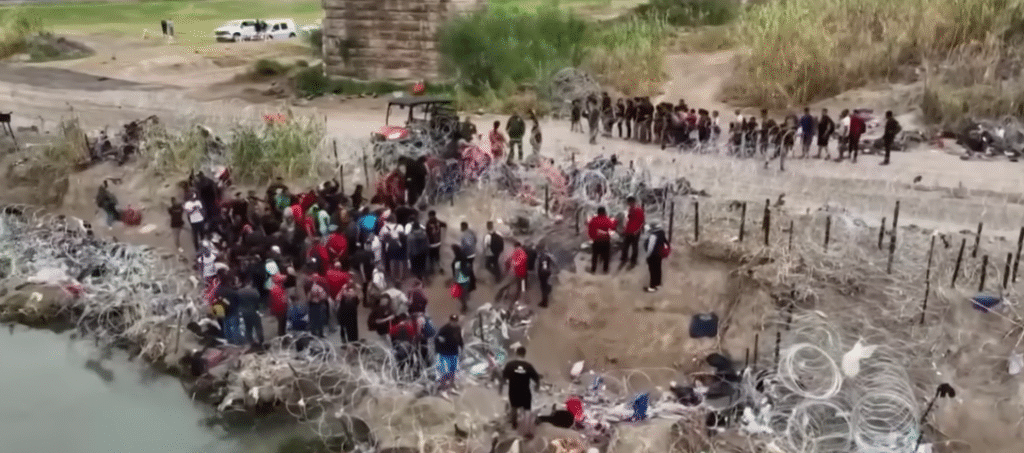The question “Do immigrants get free healthcare?” has once again dominated headlines in recent months as budget talks in Washington have stalled. The myth that undocumented immigrants benefit from taxpayer-funded health insurance is frequently spread in speeches and on social media. However, the reality is very different from the noise around it, and it is also remarkably simpler.
Undocumented immigrants continue to be totally excluded from federal healthcare programs like Medicaid, Medicare, and the insurance marketplaces established by the Affordable Care Act, according to Georgetown University’s Center for Children and Families. Depending on how long they have been in the nation, even many lawfully present immigrants have eligibility restrictions. No policy change has given undocumented people “free” coverage, despite vehement claims to the contrary.
Critics charged Democrats with requesting public funding for “illegal immigrant healthcare” during recent government shutdown debates. The claim made by Vice President JD Vance that Democrats wished “to fund healthcare for illegal aliens” quickly went viral on the internet. However, Georgetown researchers pointed out that those charges were completely unfounded. Only citizens and lawfully present residents were covered by the proposed healthcare extensions.
Table: U.S. Immigrant Healthcare Access Overview
| Category | Information |
|---|---|
| Country | United States |
| Relevant Programs | Medicaid, Medicare, Marketplace (ACA) |
| Eligibility for Undocumented Immigrants | Not eligible for Medicaid, Medicare, or ACA Marketplace |
| Emergency Care Access | Yes — emergency rooms must provide care regardless of immigration status |
| State Variations | Some states offer limited programs for children, pregnant women, or low-income residents regardless of status |
| Key Legislation | Affordable Care Act (ACA), H.R. 1, Emergency Medical Treatment and Labor Act (EMTALA) |
| Reference | Georgetown University CCF |

Because it capitalizes on emotional tension, this disinformation has been politically beneficial. For many years, healthcare has served as a stand-in for more general ideological conflicts over justice, identity, and belonging. However, there is a system that is notably misunderstood beneath the rhetoric. Emergency medical services are only available to undocumented immigrants because hospitals are required by federal law to stabilize anyone in crisis, regardless of their background or financial situation.
Although it has saved many lives, the Emergency Medical Treatment and Labor Act (EMTALA) was never intended to offer long-term care. It guarantees prompt care for an uninsured patient experiencing a heart attack, stroke, or pregnancy complication. Through Emergency Medicaid, hospitals are subsequently partially reimbursed, but only for eligible patients who are unable to provide proof of their legal status and meet income limits. The goal is not political but humanitarian.
Remarkably, childbirth is covered by roughly half of all Emergency Medicaid reimbursements; therefore, many of those “beneficiaries” are mothers giving birth to children who are citizens of the United States by birth. Therefore, the care is a public health measure safeguarding future citizens rather than a free benefit to noncitizens. When political arguments are made, this distinction is conveniently blurred.
Undocumented immigrants frequently completely forego treatment in the healthcare system due to financial strain or fear. When they do seek care, it is typically for untreated advanced illnesses, which greatly reduces the effectiveness of the system. Despite being politically unpopular, medical economists contend that preventive access may actually lower overall emergency costs. Years of discussion have not resolved this policy conundrum.
Limited solutions are being experimented with by states. Regardless of status, residents under 26 and adults over 50 are now covered by California’s Medi-Cal expansion. New York and Illinois have similar programs. Because they prioritize prevention over crisis care and demonstrate a practical awareness that ignoring public health has long-term financial consequences, these state-level initiatives are especially creative.
But public opinion is still very divided. The phrase “free healthcare” elicits strong feelings in a lot of Americans. In actuality, however, healthcare in the United States is never provided for free; someone always has to pay. Regardless of nationality, hospitals, local governments, and sometimes charitable organizations pick up the unpaid bills left by uninsured patients. Eventually, higher premiums and service fees are a result of these expenses.
Nevertheless, the amount of money spent on healthcare by immigrants is frequently overstated. According to a Kaiser Family Foundation study, undocumented immigrants make up less than 1% of the nation’s healthcare spending, which is much less than their labor force participation rate. Even when they use invalid identification numbers, many people also pay taxes through payroll deductions, thereby funding programs they will never be able to access. The irony is especially glaring.
Health care providers frequently characterize the problem as human rather than political. Ethics, not politics, govern how doctors treat everyone who enters their offices. According to renowned public health advocate Dr. Leana Wen, “viruses don’t check passports.” She made a very clear observation: public health policy needs to take into account the fact that health crises are not discriminatory.
This idea became painfully clear during the pandemic. From agriculture to logistics, undocumented workers kept vital industries running, but many of them did not have early access to testing and vaccination. A growing movement for inclusive healthcare reform was spurred by this paradox: essential labor combined with little protection. Proponents contend that resilience and national stability are more important than generosity when it comes to basic care.

